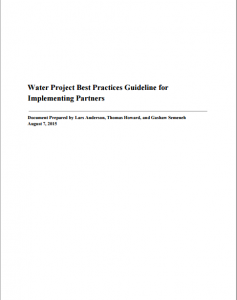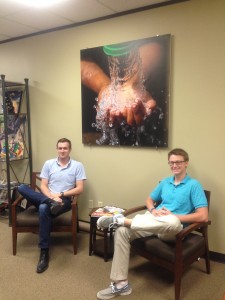Yesterday was the last day of my fellowship with Water to Thrive (W2T) and tomorrow, I’ll be boarding my ninth plane of the summer headed back to my family. Did you get that? Nine planes. Now, I wish I had recorded the exact airtime that amounts to, but a rough estimation comes out to just short of two full days above the clouds. For anyone who hasn’t seen what I’ve been up to this summer, I’ve been in the wonderful heat of Austin, Texas. Before settling here for the summer, however, I went on a two-week trip to Ethiopia with W2T where we toured the country and experienced the results of enabling and empowering rural communities through the gift of clean and accessible water. It’s fascinating for me to think of the amount of time I’ve spent in planes this summer, because it wasn’t so long ago that I had little interest in traveling. I was comfortable with the environment in which I grew up, and I guess that explains why it’s less than a three-hour drive home from school. I am beyond joyful that I ended up at such a fantastic university that made me aware of and prompted me to go to places I hadn’t considered before.
In my last post, I reflected on the idea that being partially immersed into another culture, especially in another country, can influence your perspective and how you understand and share that perspective with others. I have continued to grapple with that idea this summer through discussions with other CAPS fellows and conversations with those in the office. I have been especially fortunate to consider this through my work on a Best Practices Document for W2T’s implementing partners. The BPD, as it has been conveniently named, will serve as a guideline for implementing partners of W2T. Its purpose is, in part, to “ensure efficient and effective service delivery while maintaining desired quality standards.” Thus, it is a resource that will be available to NGO partners as well as a way for Water to Thrive to evaluate the quality of services that their partners provide to rural communities.
The idea of the document might sound really great, and in our research this summer, Thomas (another W2T intern) and myself have seen that there is a whole network of great resources out there for non-profits and NGOs that aim to accomplish something similar to ours. However, we have come to realize that those who work in international development must be very mindful of the role that we can play. Thomas has a saying that goes: “Never do for somebody else what they can do for themselves.” It has become something that we keep constantly on our minds as we write the document because in the area of rural water supply, failure to work by that saying has caused many water projects to fail far sooner than they should. Many good-intentioned and qualified people have worked, individually and through organizations, toward providing clean water to those who need it, and have failed to fully grasp that it is community initiative, not just expert outsider influence, that allows for sustainable projects.
As we’ve proceeded with the BPD, we’ve wrestled with identifying areas where we are at liberty to require, or should rather just recommend. We’ve also come across areas where we ought not try to offer anything because either we don’t know, can’t understand as Americans, or need to leave it completely open for the community to decide. To try to account for this, the above mentioned idea of community initiative has formed the basis for the BPD. From the selection of the location to the long-term maintenance of the project, the community is to be fully involved. The communities to be served are chosen by Water to Thrive partners based on their need, but also on their willingness and ability to manage and maintain the water point. All beneficiaries of the water are required to pay, if they are able, a small monthly amount of money that is saved toward a maintenance fund, as well as used to pay a guard who ensures that the water point is not abused. All W2T projects are required to have Water, Sanitation, and Hygiene (WASH) committees. These committees start to form before construction even begins and members take on different roles to manage the water point, as well as prompt community members to make decisions that are in the best interest of all. The community is expected to contribute to the construction of the project in different ways. That may include providing laborers or even paving a road for construction vehicles. In the experience of Water to Thrive, these initiatives along with many others have led to successful and sustainable projects. My hope is that Thomas and I were able to communicate humbly, accurately, and clearly and that the BPD may become a useful resource for W2T’s partners.
Working for W2T this summer has been invaluable to me in many ways and taught me countless lessons. I’ll just write about a few. I’ve learned how to be a better team member, as Thomas and I have needed to come to mutual decisions about the best, yet realistic, procedures. I’ve learned to struggle with a tough task, to make a plan and make deadlines, to improvise when information is lacking or an email response won’t come. I’ve learned about the constant need to put aside initial perceptions or ideas that I feel like should be used, and rather place focus on what may really be best for communities. I’ve learned that success is sometimes found in the process more than at the end. I think this last one has been the most encouraging, since we didn’t write all we wanted to into the document. It’s been an incredible journey this summer, though, as I’ve worked with great people in the office and in Ethiopia. I’m sad to leave so early, but excited to see how the experience and lessons learned this summer guide me forward.



Pingback: Iskysoft data Eraser
Pingback: movie buy review